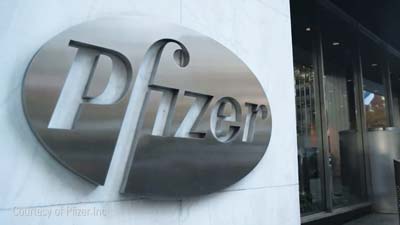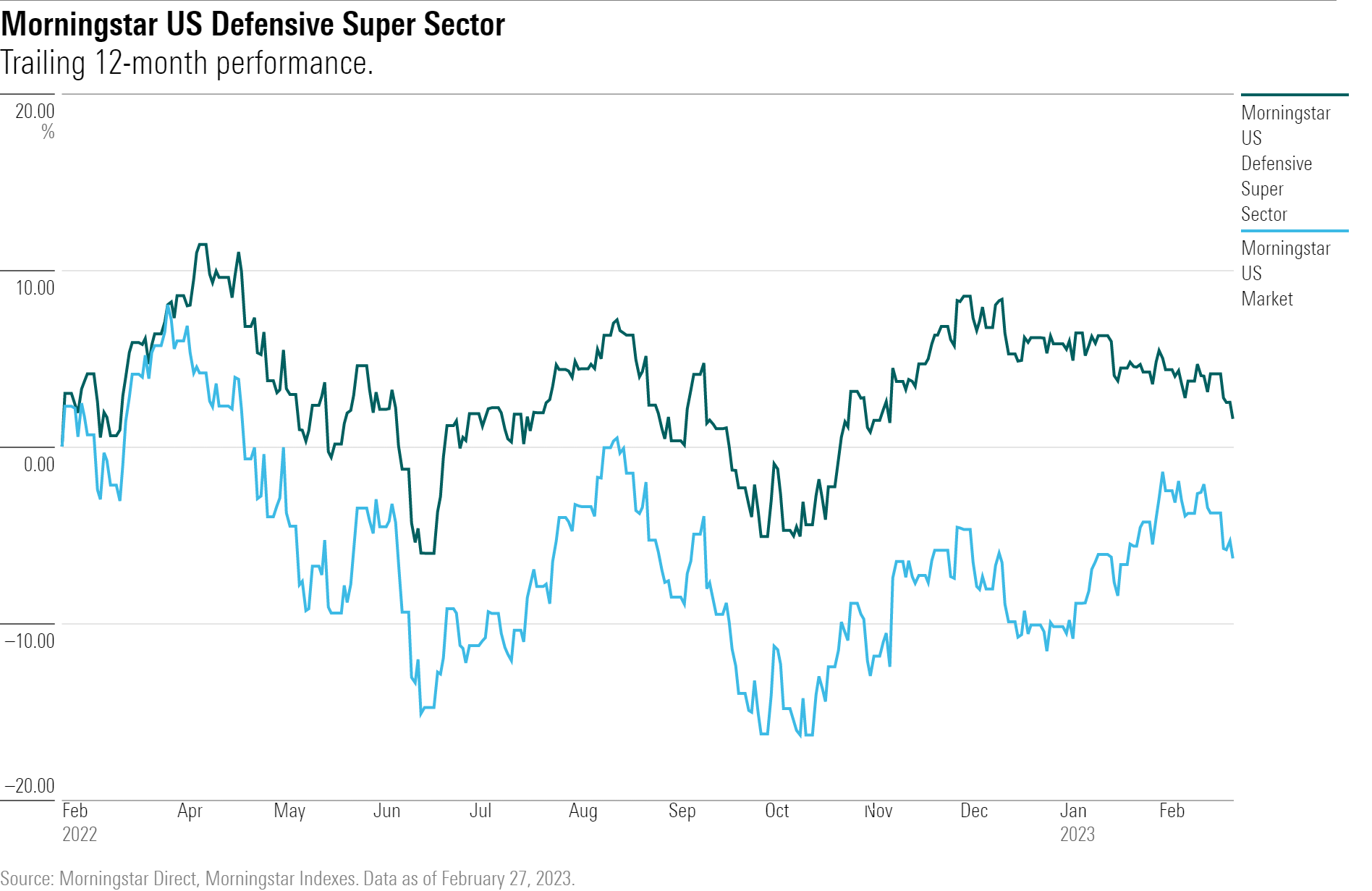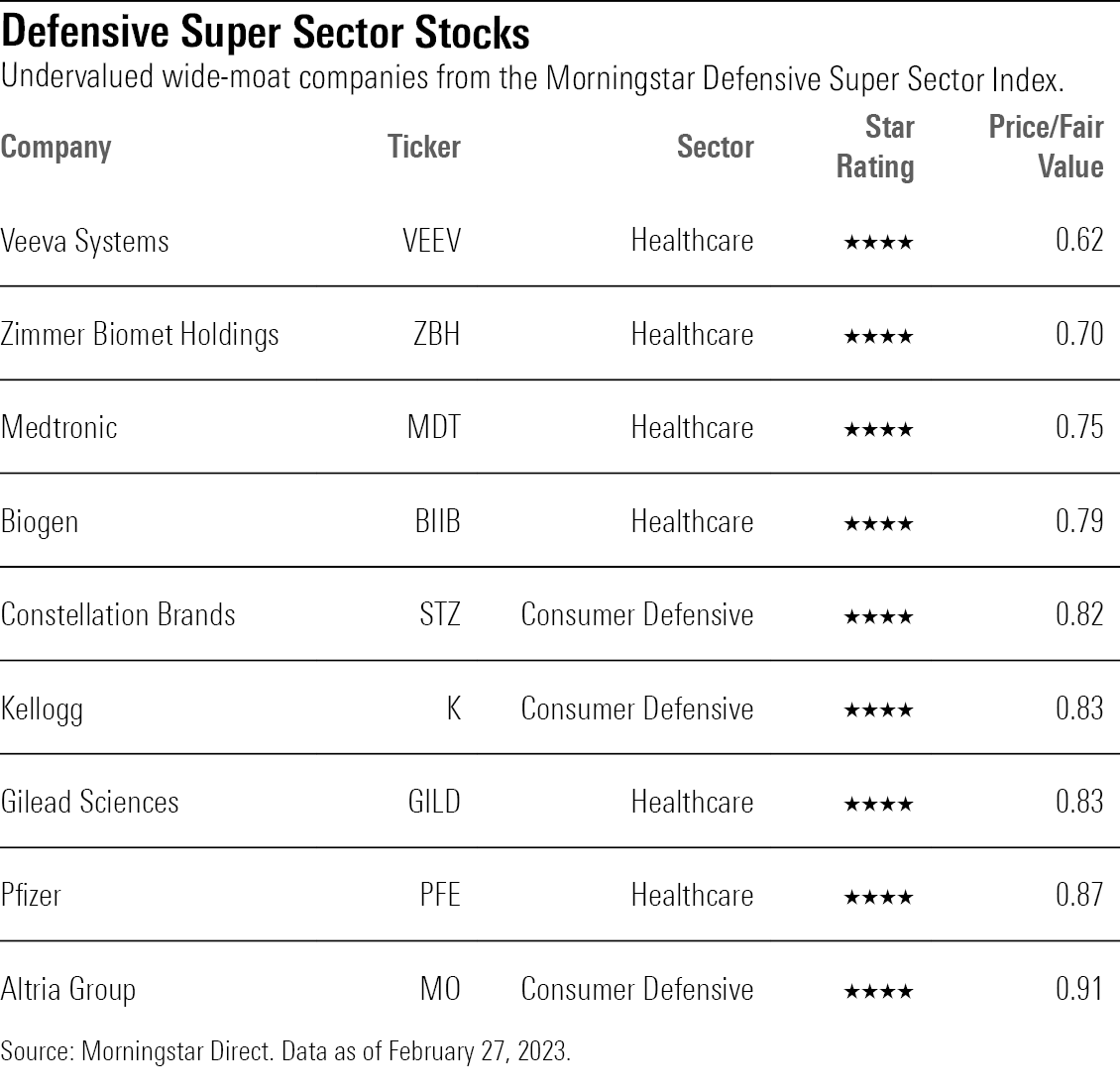Undervalued Defensive Stocks to Buy Now
High-quality names such as Veeva, Medtronic, Pfizer, and Kellogg are trading at discounted prices.

The past year was a rough one for the stock market, but defensive stocks still made gains as a group.
The good news for long-term investors looking to put money to work in defensive stocks is that there are still plenty of cheap defensive stocks worth considering. Morningstar equity analysts see room for growth in a number of high-quality, defensive names such as Veeva Systems VEEV and Medtronic MDT.
To look for undervalued defensive stocks, we turned to the Morningstar US Defensive Super Sector Index, which measures the performance of stocks from traditionally defensive sectors such as utilities, consumer defensive, and healthcare.
The Morningstar US Defensive Super Sector Index gained 1.6% for the past 12 months through Feb. 27, 2023, while the broader market fell 6.3%, as measured by the Morningstar US Market Index.
Of the 323 defensive stocks in the index, 150 are covered by Morningstar analysts. Of those 150, 45 were considered undervalued as of Feb. 27, 2023.

What is a Defensive Stock?
Defensive stocks are normally resistant to economic cycles because their products are necessary in good times or bad. Consumer defensive companies are engaged in the manufacturing of food and beverages, household and personal products, packaging, and tobacco. Some consumer defensive companies provide education and training services. UnitedHealth Group UNH, Merck MRK, and PepsiCo PEP are among the largest companies in the Defensive Super Sector Index.
Defensive Stocks to Buy Now
We looked for the most undervalued stocks in the Morningstar US Defensive Super Sector Index that currently carry a Morningstar Rating of 4 or 5 stars. Then we looked for stocks that have earned a Morningstar Economic Moat rating of wide, in order to screen for companies with durable competitive advantages. Over the long-term, investing in undervalued stocks with moats can improve the odds of outperforming.
These were the nine most undervalued stocks in the Morningstar Defensive Super Sector Index as of Feb. 27
- Veeva Systems
- Zimmer Biomet Holdings ZBH
- Medtronic
- Biogen BIIB
- Constellation STZ
- Kellogg K
- Gilead Sciences GILD
- Pfizer PFE
- Altria Group MO
The most undervalued defensive stock in the screen is Veeva Systems, trading at a 38% discount to the fair value estimate set by Morningstar analysts. The least undervalued on the list is Altria Group, trading at a 9% discount.

Veeva Systems
- Industry: Health Information Services
- Stock Price: $165.75
- Morningstar Fair Value Estimate: $265
“Veeva is the leading provider of cloud-based software solutions tailored to the life sciences industry. It provides an ecosystem of products to address the operating challenges and regulatory requirements that companies in the space face. Instead of focusing on a general, one-size-fits-all system, Veeva has created platforms that are purely designed to serve one industry.”
“We assign Veeva a wide moat rating because we believe the firm’s high retention rate and its customers’ unlikeliness to move to a different product (switching costs) should continue to support economic profits for at least the next 20 years.”
“We expect the commercial business to grow at a modest to high single-digit rate over the next five years. For Research and Development solutions, we expect revenue growth to soften but we still expect a very strong growth for this defensive stock in the healthcare industry over the next five years with a revenue CAGR of 22%.”
—Keonhee Kim, equity analyst
Zimmer Biomet Holdings
- Industry: Medical Devices
- Stock Price: $123.30
- Morningstar Fair Value Estimate: $175
“Zimmer’s strategy is two-pronged. First, it is focused on cultivating close relationships with orthopedic surgeons who make the brand choice. High switching costs and high-touch service keep the surgeons closely tied to their primary vendor, and the surgeons bring in enough profitable procedures to keep hospital administrators at bay.”
“Second, the firm aims to accelerate growth through innovative products and improved execution. The latter is critical, in our view, to realizing the firm’s potential.”
“Zimmer’s wide economic moat stems from two major sources. First, there are substantial switching costs for orthopedic surgeons. The extensive instrumentation, or tool sets, used to prepare bones and install implants are specific to each company. The learning curve to become proficient in using one company’s instrumentation is significant.”
“We’re holding steady on our fair value estimate of this defensive stock at $175 per share, which reflects our expectation that more normal procedure volume will be able to flow through after 2022 thanks to widespread vaccinations and some level of COVID-19 immunity acquired by extensive infection by previous variants.”
—Debbie S. Wang, senior equity analyst
Medtronic
- Industry: Medical Devices
- Stock Price: $83.39
- Morningstar Fair Value Estimate: $112
“Medtronic’s standing as the largest pure-play medical device maker remains a force to be reckoned with in the medtech landscape. Pairing Medtronic’s diversified product portfolio aimed at a wide range of chronic diseases with its expansive selection of products for acute care in hospitals has bolstered its position as a key partner for its hospital customers. Medtronic has historically focused on innovation, designing and manufacturing devices to address cardiac care, neurological and spinal conditions, and diabetes.”
“Overall, we now include the following in our assumptions for Medtronic: a more gradual resumption of prepandemic procedure volume in fiscal 2023 and 2024, hospital labor constraints that will prevent significant expansion of capacity through the midterm, and the anticipated launch of renal denervation by early 2024. We project 3% average annual top-line growth through fiscal 2027, as procedure volume returns and stabilizes closer to prepandemic levels over the next 18 months.”
—Debbie S. Wang, senior equity analyst
Biogen
- Industry: Drug Manufacturers-General
- Stock Price: $269.20
- Morningstar Fair Value Estimate: $340
“We think Biogen’s specialty-market-focused drug portfolio and novel, neurology-focused pipeline create a wide economic moat. Biogen’s strategy has its roots in the 2003 merger of Biogen (multiple sclerosis drug Avonex) and Idec (cancer drug Rituxan). While Rituxan is succumbing to biosimilar competition, Biogen is expanding its neurology portfolio beyond multiple sclerosis, including blockbuster neuromuscular disease drug Spinraza and several promising drugs, including Leqembi in Alzheimer’s disease.”
“Biogen’s profitability depends on three key blockbusters (Avonex/Plegridy, Tysabri, and Spinraza) and a high-risk, but potentially high-reward pipeline, led by recently approved Alzheimer’s disease drug Leqembi. While demand is relatively inelastic for Biogen’s portfolio of MS treatments, the commercial failure of Alzheimer’s drug Aduhelm demonstrates the high-risk nature of some of Biogen’s pipeline targets, and our Morningstar Uncertainty Rating for Biogen is therefore High.”
—Karen Andersen, sector strategist
Constellation Brands
- Industry: Beverages—Wineries & Distilleries
- Stock Price $224.69
- Morningstar Fair Value Estimate: $274
“While Constellation Brands historically made its bones as a winery and distillery, we now view the firm as one of the most stellar brewers across our global coverage. After parlaying AB InBev’s antitrust quandary (allowing it to acquire Mexican brewer Grupo Modelo) into exclusive U.S. ownership rights to brands like Corona and Modelo, we see the firm’s overall Mexican beer portfolio as auspiciously situated at the confluence of unwavering secular and demographic trends. With an enviable growth profile and best-of-breed margins, we have confidence that the beer business can thrive even amid an evolving industry landscape.”
“The firm is not resting on its laurels, however, as it continues to expand its addressable market by widening the gamut of categories in which it competes. One of the primary avenues through which it is seeking to do this is innovation, with line extensions like Corona Refresca and Fresca Mixed being quintessential illustrations. Management seeks 25% of its growth to be driven by innovation, a mark we think is achievable given the broad resonance of its trademarks.”
“The firm’s wine and spirits business should offer some stability, after the divestiture of lower-quality brands, allowing Constellation to place more intentionality behind its “high growth, high margin” long-term strategy.”
—Jaime M. Katz, senior equity analyst
Kellogg
- Industry: Packaged Foods
- Stock Price: $67.51
- Morningstar Fair Value Estimate: $82
“Despite Kellogg’s intentions to spin off its North American cereal and plant-based alternative brands from its global snacking operations, our wide moat rating is unchanged. This rating reflects our confidence surrounding Kellogg’s ability to generate returns above its cost of capital (even under a more bearish set of assumptions) over the next two decades, stemming from its intangible assets and cost edge. We think its position as a leading packaged food manufacturer and its arsenal of resources have afforded Kellogg the ability to maintain valuable shelf space for its offerings, even in the cereal aisle, where category dynamics have languished from the onslaught of competition resulting from lower-priced private-label fare, other branded operators, and the encroachment of smaller foes from within the category and other breakfast alternatives.”
“We believe Kellogg also maintains a cost edge resulting from the economies of scale in production and distribution across its global network, which has afforded it the ability to invest significant resources behind research and development and advertising. We expect this competitive advantage should result in excess economic profits, with returns on invested capital (including goodwill) averaging in the midteens over the length of our explicit forecast, exceeding our 7% weighted average cost of capital for at least the next 20 years.”
“We assign Kellogg a Medium Uncertainty Rating. Kellogg intends to separate its global snacking operations from its North American cereal and plant-based alternative arms, and we forecast management attention could be monopolized by the split over the next 18 months, impeding its ability to be responsive to evolving competitive, consumer, and macro trends.”
“Further, with around 40% of sales generated outside the U.S., Kellogg is exposed to foreign exchange fluctuations, which may eat into sales and profits from time to time.”
—Erin Lash, senior director
Gilead Sciences
- Industry: Drug Manufacturers—General
- Stock Price: $80.89
- Morningstar Fair Value Estimate: $97
“Gilead Sciences generates stellar profit margins with its HIV and HCV portfolio, which requires only a small salesforce and inexpensive manufacturing. We think its portfolio and pipeline support a wide moat, but Gilead needs HCV market stabilization, strong continued innovation in HIV, solid pipeline data, and smart future acquisitions to return to growth.”
“Gilead is building a pipeline outside of HIV and HCV through acquisitions. The acquisition of Kite (CAR-T therapy Yescarta) is beginning to generate significant sales growth as the drug is used in earlier-stage patients, and the 2020 acquisitions of Forty Seven (CD47 antibody magrolimab) and Immunomedics (breast cancer drug Trodelvy), as well as a collaboration with Arcus, add to the oncology pipeline. Gilead’s Veklury is also a leading treatment for SARS-CoV-2; it generated $5.6 billion in sales in 2021, and although sales are declining, we think an oral antiviral in testing could have some long-term sales potential.”
—Karen Andersen, sector strategist
Pfizer
- Industry: Drug Manufacturers-General
- Stock Price $40.78
- Morningstar Fair Value Estimate: $48
“Pfizer’s foundation remains solid, based on strong cash flows generated from a basket of diverse drugs. The company’s large size confers significant competitive advantages in developing new drugs. This unmatched heft, combined with a broad portfolio of patent-protected drugs, has helped Pfizer build a wide economic moat around its business.”
“Pfizer faces generic competition, potential drug pricing policy changes by governments, an increasingly stringent FDA, and stronger managed-care and pharmacy benefit manager negotiating power. New-drug development has become challenging in several disease areas with a more risk-conscious FDA. Additionally, managed-care companies and pharmacy benefit managers have grown stronger during the past two decades into powerful entities that can negotiate lower drug prices. However, overall we view Pfizer’s uncertainty as medium partly based on the low volatility of cash flows from a diverse product portfolio with inelastic demand.”
—Damien Conover, senior director
Altria Group
- Industry: Tobacco
- Stock Price: $46.54
- Morningstar Fair Value Estimate-$52
“Altria is no longer a pure play on U.S. cigarettes. Over 15% of our valuation is derived from its 10.2% share of Anheuser-Busch InBev, and of the consolidated business, 14% of EBIT came from oral tobacco in 2021, while recent acquisitions in vaping and cannabis are likely to be contributors to EBIT in the near future. Nevertheless, U.S. cigarettes remains the driver of Altria’s earnings, because following the breakup of Philip Morris in 2008, Altria operates solely in the U.S., while Philip Morris International, or PMI, owns the rights to the brands elsewhere.”
“Although it is in secular contraction, the U.S. cigarette market is a relatively attractive one. We forecast the volume decline rate of the U.S. cigarette market to be around 4% per year, a slightly faster rate of decline than most markets. However, the ability to consistently price above the rate of volume declines should ensure that Altria can continue to increase its revenue, earnings, and dividend.”
“An addictive product and almost insurmountable barriers to entry in the tobacco industry form strong intangible assets and give Altria a wide economic moat, in our opinion.”
“The addictive nature of the product forms a powerful competitive advantage when combined with very tight government regulation that over the years has served to damp market share volatility and competition on price.”
—Philip Gorham, director
The author or authors do not own shares in any securities mentioned in this article. Find out about Morningstar’s editorial policies.

/s3.amazonaws.com/arc-authors/morningstar/b6df6e65-17f1-42fc-b7b8-eb07615d9eef.jpg)
/cloudfront-us-east-1.images.arcpublishing.com/morningstar/TP6GAISC4JE65KVOI3YEE34HGU.jpg)
/cloudfront-us-east-1.images.arcpublishing.com/morningstar/RFJBWBYYTARXBNOTU6VL4VSE4Q.png)
/cloudfront-us-east-1.images.arcpublishing.com/morningstar/YQGRDUDPP5HGHPGKP7VCZ7EQ4E.jpg)
:quality(80)/s3.amazonaws.com/arc-authors/morningstar/b6df6e65-17f1-42fc-b7b8-eb07615d9eef.jpg)